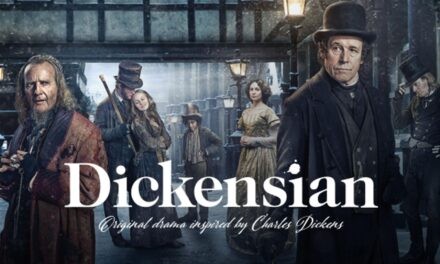As the whole world is about to discover, Britain is more than usually wet this year. As Charlie Brooker puts it, we will be trying to stage the Olympics under water. So imagine my delight at BBC One’s latest primetime miniseries Blackout. It’s a drama of political corruption, set in a rainsodden city dominated by Victorian buildings with a drastic shortage of lighting. All the locations are dark and dingy, lit with random sources of dirty sodium or anaemic fluorescent light. The rain sluices down almost constantly. Even the domestic spaces seem to be barely converted 150 year old warehouses, done up by an interior designer addicted to the chocolate spectrum. Then, inexplicably, we see another city, but only from the sky: a city of skyscrapers. Characters sometimes look out on this city from other modern (but still underlit) office spaces.
What better way to enjoy a foul British summer in the grip of a recession and a constant feed of news about financial corruption and private sector incompetence? It seemed to have hit the moment uncannily well; it looked and sounded just right. The themes were there in the first episode: desperate people flailing around in a dystopian city near you. And then there were the artists: especially Christopher Ecclestone (playing Daniel Demoys) in the lead, Bill Gallagher as writer and a major role for Ewen Bremner. But by episode three, I agreed with Bremner’s character who suddenly exited completely after being punched in the face by Ecclestone. His unexplained absence was even commented upon by another character. He had clearly just had enough. Not that he could escape to another channel: as one critic remarked, Ecclestone’s performance was so loud you could hear it on ITV.
So what went wrong? The first episode took us through Demoys’ theft of council tender documents whist downing implausible amounts of spirits; his failure to attend his daughter’s ballet performance; and an increasingly incoherent (both personally and plotwise) drunken evening which he attempted to reconstruct the next day. He had killed someone: a corrupt developer played by dependable villain David Hayman (ie he deserved to die). Then it all went wrong: themes went scurrying off into worlds of their own. We had alcoholism, infidelity, obsessive relationships, privatisation of public services, police corruption, political despondency. Each theme had its own character. For alcoholism we had a sympathetic nurse, herself a sufferer, played by Branka Katic. For obsessive relationships we had the ineffectual detective Dalien Bevan (Andrew Scott) invading his ex-wife’s home. And guess what: all Demoys had to do was to ricochet between these people, many of whom, for convenience were somehow related to each other.
So it was melodrama of Sirkian dimensions. But unlike a Sirk film, Blackout never settled down in any particular territory. It was held together by Demoys’ search for redemption, for forgiveness, for making things right. So he becomes the populist mayor for this self-loathing city, an anti-Boris Johnson. Then he’s blackmailed by the sinister corporation that want to take over, so he – all by himself – thinks up a workers’ co-operative solution to public services; but then really he wants to make things up to his long-suffering wife (Dervla Kirwan) and his damaged children. The nurse does that better than him, though, with an effective scene where no-one shouts. So then there’s the murdered man’s daughter who he is helping out… and off we go for a couple of speeches in that direction before… well I forget but there were some BIGGGG speeches.
Even Ecclestone seems confused about how the script works: “Daniel Demoys is an interesting figure in that he was once a very idealistic young man who got drawn into local politics and slowly allowed himself to become cynical and disillusioned, and he lost his ideals. He has an addictive personality and started to indulge himself personally, being addicted to alcohol and drugs. … The drama then becomes a why-dunnit rather than a whodunit. … Daniel’s a contradictory character because he has a deep love for his wife and for his children, but he has pure hatred for himself. So consequently he ends up treating his family disrespectfully because he has no self-respect in the way he indulges himself. He’s probably got more in common with Raskolnikov from Crime and Punishment, or Macbeth… You see the differing impact on children if a parent is an addict, and it manifests itself in different ways in the children. The impact of the addict on the family is a very major strand in the drama which sits alongside the thriller element. It is very much a thriller, and not just about the politics. The politics are the politics of a graphic novel, quite simplistic. If you examine what Daniel is expounding it’s probably communism but what’s foregrounded is the thriller element and the family element. Those are the two things that are primarily the motors of the three episodes.”
It must have looked good on paper. It certainly looked good in the rushes. But the script editor must have left the building at about the same time as Ewen Bremner. Because when they came to cut it all together, the problems emerged. They were planning to cross State of Play and the rainsoaked world of film noir. The one place that could have done with a bit more light was the structure of the script. Why, in a system where scripts are endlessly redrafted, did this happen?
JOHN ELLIS is Professor of Media Arts at Royal Holloway University of London. He is the author of Documentary: Witness and Self-revelation (Routledge 2011), TV FAQ (IB Tauris 2007), Seeing Things (IB Tauris 2000) and Visible Fictions (1984). Between 1982 and 1999 he was an independent producer of TV documentaries through Large Door Productions, working for Channel 4 and BBC. He is chair of the British Universities Film & Video Council and leads the Royal Holloway team working on EUscreen. His publications can be found HERE.





